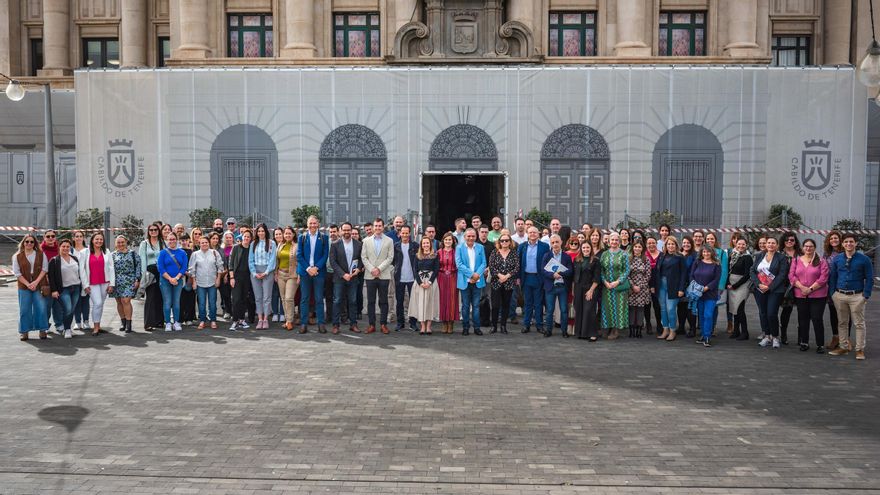
The most extensive job placement program in Canary Islands, Neighborhoods for Employment, Tenerife turns ten “stronger than ever,” according to the assessment of its major supporters, the Council and the voluntary solidarity organizations, the so-called third sector. The president of the island corporation, Rosa Dávila, announced yesterday during the presentation of the renewed project for 2024, an additional increase of 300,000 euros this year, bringing the total to 4.2 million from the previous 3.9 million. She did it as a surprise, as not even the Minister of Employment, Efraín Medina, knew about it. “There had to be some advantage to being a president and also responsible for Finance,” Dávila joked amid applause from the packed Noble Hall.
The president highlighted the work of the entities that carry out the initiative – Diocesan Caritas, Red Cross, Don Bosco Foundation, General Foundation of the University of La Laguna (ULL) and the Insular Society for the Promotion of People with Disabilities (Sinpromi)– and the coordination by the dependent Insular Foundation for Training, Employment, and Entrepreneurial Development (Fifede). She also mentioned the technical staff who carry out a “fully consolidated” project. This is evidenced by a statistic: during the past year, it provided employment for 1,400 people. The most vulnerable among the vulnerable.
The 2024 Barrios por el Empleo: Juntos más Fuertes program is renewed once again with the aim of improving the employability of people who are unemployed on the island. Alongside Dávila and Medina, the head of the Employment program at Red Cross, Elena Marco, spoke on behalf of the entities. They revealed the novelties, including the support for companies to hire people at risk of labor or social exclusion, or even in both cases.
Vulnerable Individuals
[–>
Dávila stated that “this is an employment program aimed at the most vulnerable people that has been consolidated over these years that “we have increased it in this edition to respond to the needs of the entities and the individuals.” The president argued that “faced with negative news and the noise it generates, today I want to highlight the success of Barrios por el Empleo: Juntos más Fuertes. She recalled that the program received recognition and interest from the King and Queen of Spain some years ago. This is possible, she assessed, “thanks to the collaboration of the entities, and above all, the people and companies that carry it out.” The initiative is aimed at residents in Tenerife who are unemployed or interested in participating in the active job search process. Last year, it helped 5,000 individuals, of which over 1,400 obtained employment. “These are the things we must continue working on to improve our island,” explained the president of the Council.
Innovations
[–>
Efraín Medina pointed out that the program has 27 axes or nodes –five of them specifically for people with disabilities– distributed throughout the island and is run by 101 individuals comprising the technical teams. This year, it will collaborate with around 1,300 companies –a total of 7,000 over the past decade–. Regarding the innovations, the minister indicated that “we will enhance and facilitate support for hiring people at risk of exclusion to companies collaborating with the project. This support will be used to finance part of the salary costs and Social Security contributions for up to three months for individuals hired at workplaces in Tenerife, provided these contracts are formalised with participants in Barrios por el Empleo and are unemployed. Medina also emphasized “cross-sectional training and empowerment of individuals with intellectual disabilities, as well as other interest groups.” These include a special focus on mental health “a leitmotif of this government since it took office,” he noted. Moreover, it will promote the implementation of employment transition programs characterised by training individuals in a range of behaviours and tasks that facilitate both the achievement and maintenance of jobs, as well as their adaptation to the work environment. Additionally, the Vocational Employment Service will be launched, an action aimed at guiding, motivating, and promoting opportunities for self-employment.
Methodology
[–>
Elena Marco expressed gratitude for the joint work carried out and the continuity of the program, as well as “the involvement of those who work, something essential because they are the ones who deal directly with individuals who are unemployed.” Marco explained the intervention methodology, which has three characteristic elements. First, Personalised Insertion Itineraries as a tool for improving employability. Second, Territorialisation of the intervention, involving the community and local resources in the project. Finally, the development of processes for obtaining, managing, and transferring knowledge produced with the shared application of the project. Regarding individuals with disabilities, the intervention is based on the principles and stages of the Employment with Support methodology. It aims to provide access to ordinary employment for individuals with severe disabilities and greater support needs.
Strategies
[–>
The strategic lines of Barrios por el Empleo: Juntos más Fuertes are the guidance and training of unemployed persons; prospecting and intermediation to form alliances with companies and create job opportunities; enhancing the framework of collaboration with participating entities; adapting project actions to the reality of the territory, improving the employability of particularly vulnerable groups, and making the actions and results known to the general population. As for the innovations launched in the previous edition of the program, the training for individuals lacking formal education to be able to sit for the key competence tests to access Vocational qualifications continues, an additional advantage in a selection process. Additionally, the program to address the specific needs and improve the employability of the Roma Community and the Technical Training School to train future employment technicians will continue.















